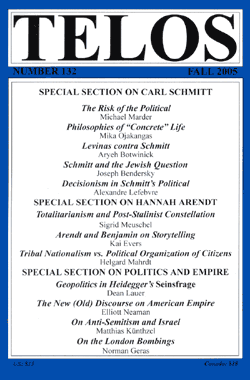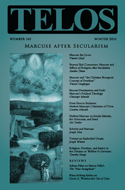By Flaminia Incecchi · Tuesday, June 7, 2016 In “On the Political: Schmitt contra Schmitt,” Benjamin Arditi is occupied with the task of revitalizing Carl Schmitt, to open or retrace various interpretative paths that allow us to use Schmitt in trajectories that he did not envisage or did not pursue. Arditi takes his reader by the hand into an exploration of a series of issues arising from Schmitt’s theory: disputes regarding the bellicose nature of the political, the identification of politics in the political, the charge of formalism, and the normative dimension of order.
Continue reading →
By Simas Čelutka · Tuesday, February 23, 2016 In his essay “Carl Schmitt on Friends, Enemies and the Political,” Andrew Norris inquires into the question that I have been interested in for quite some time: political friendship in Carl Schmitt’s political philosophy. Schmitt’s interpreters usually focus on the issue of enmity in his concept of the political, not least because Schmitt himself elaborates on the existential significance of political enmity much more extensively. From a conceptual point of view, however, political friendship should be viewed as at least equally relevant a part of Schmitt’s account of the political. The specific criterion of the political is famously the distinction “between friend and enemy,” not simply an indefatigable presence of political enmity. Norris should be lauded for his attempt to foreground a crucial, though still insufficiently explored, notion of a political (public) friend in Schmitt’s Concept of the Political.
Continue reading →
By Simas Čelutka · Wednesday, January 27, 2016  Today’s world is witnessing a noticeable intensification of hostilities and confrontations on many fronts of international relations. A revisionist and neo-imperialist Russia, annexing Crimea and staging a cynical proxy war in Eastern Ukraine in 2014, is challenging the very foundations of the post–Cold War international order. The Syrian “quagmire,” which began in 2011, created a space for the emergence and gradual establishment of the so-called Islamic State (ISIS), now widely recognized as the paramount terrorist organization threatening the security architecture in the Middle East as well as Europe. Terrorist attacks in France, Egypt, Mali, Tunisia, Lebanon, and other countries have been widely and justifiably interpreted as warnings signaling that Europe (or the West in general) is unable to cope with its new enemies. The chaos and uncertainty that ensued after the flood of refugees and migrants into Europe only exacerbated the perception of weakness and unwillingness on the part of the Western leaders to tackle these challenges seriously. In this alarming context, political philosophy once again gains significance as an existential occupation. This is the reason why a re-evaluation of the controversial oeuvre of Carl Schmitt, the thinker who articulated some of the most acute criticisms of modern liberalism, is so timely. Today’s world is witnessing a noticeable intensification of hostilities and confrontations on many fronts of international relations. A revisionist and neo-imperialist Russia, annexing Crimea and staging a cynical proxy war in Eastern Ukraine in 2014, is challenging the very foundations of the post–Cold War international order. The Syrian “quagmire,” which began in 2011, created a space for the emergence and gradual establishment of the so-called Islamic State (ISIS), now widely recognized as the paramount terrorist organization threatening the security architecture in the Middle East as well as Europe. Terrorist attacks in France, Egypt, Mali, Tunisia, Lebanon, and other countries have been widely and justifiably interpreted as warnings signaling that Europe (or the West in general) is unable to cope with its new enemies. The chaos and uncertainty that ensued after the flood of refugees and migrants into Europe only exacerbated the perception of weakness and unwillingness on the part of the Western leaders to tackle these challenges seriously. In this alarming context, political philosophy once again gains significance as an existential occupation. This is the reason why a re-evaluation of the controversial oeuvre of Carl Schmitt, the thinker who articulated some of the most acute criticisms of modern liberalism, is so timely.
Continue reading →
By Joseph Diaz · Tuesday, January 21, 2014 Joseph Diaz’s “Schmitt and Marcuse: Friends, Force, and Quality” appears in Telos 165 (Winter 2013). Read the full version online at the Telos Online website, or purchase a print copy of the issue in our store.
 This article aims at exploring the potential for a politically operative theory of opposition to liberalism’s stultifying politics of process. Given their formal political positionality as critics of liberal neutrality, as well as their historically particular relationship to some of the most volatile politics of the twentieth century, Marcuse and Schmitt cannot but be brought into discourse with one another in the most pressing of times, for three reasons. First, by exploring the modalities of their respective criticisms, this article locates an enemy common to both thinkers in the neutralization of the political through the attempted elimination of the decision. Second, in using Schmitt’s framework of the friend-enemy distinction, further investigation into the potential complicities between anti-liberal thought illuminates the limitations of founding political friendship on mere enemy identification alone. This article aims at exploring the potential for a politically operative theory of opposition to liberalism’s stultifying politics of process. Given their formal political positionality as critics of liberal neutrality, as well as their historically particular relationship to some of the most volatile politics of the twentieth century, Marcuse and Schmitt cannot but be brought into discourse with one another in the most pressing of times, for three reasons. First, by exploring the modalities of their respective criticisms, this article locates an enemy common to both thinkers in the neutralization of the political through the attempted elimination of the decision. Second, in using Schmitt’s framework of the friend-enemy distinction, further investigation into the potential complicities between anti-liberal thought illuminates the limitations of founding political friendship on mere enemy identification alone.
Continue reading →
|
|
 Today’s world is witnessing a noticeable intensification of hostilities and confrontations on many fronts of international relations. A revisionist and neo-imperialist Russia, annexing Crimea and staging a cynical proxy war in Eastern Ukraine in 2014, is challenging the very foundations of the post–Cold War international order. The Syrian “quagmire,” which began in 2011, created a space for the emergence and gradual establishment of the so-called Islamic State (ISIS), now widely recognized as the paramount terrorist organization threatening the security architecture in the Middle East as well as Europe. Terrorist attacks in France, Egypt, Mali, Tunisia, Lebanon, and other countries have been widely and justifiably interpreted as warnings signaling that Europe (or the West in general) is unable to cope with its new enemies. The chaos and uncertainty that ensued after the flood of refugees and migrants into Europe only exacerbated the perception of weakness and unwillingness on the part of the Western leaders to tackle these challenges seriously. In this alarming context, political philosophy once again gains significance as an existential occupation. This is the reason why a re-evaluation of the controversial oeuvre of Carl Schmitt, the thinker who articulated some of the most acute criticisms of modern liberalism, is so timely.
Today’s world is witnessing a noticeable intensification of hostilities and confrontations on many fronts of international relations. A revisionist and neo-imperialist Russia, annexing Crimea and staging a cynical proxy war in Eastern Ukraine in 2014, is challenging the very foundations of the post–Cold War international order. The Syrian “quagmire,” which began in 2011, created a space for the emergence and gradual establishment of the so-called Islamic State (ISIS), now widely recognized as the paramount terrorist organization threatening the security architecture in the Middle East as well as Europe. Terrorist attacks in France, Egypt, Mali, Tunisia, Lebanon, and other countries have been widely and justifiably interpreted as warnings signaling that Europe (or the West in general) is unable to cope with its new enemies. The chaos and uncertainty that ensued after the flood of refugees and migrants into Europe only exacerbated the perception of weakness and unwillingness on the part of the Western leaders to tackle these challenges seriously. In this alarming context, political philosophy once again gains significance as an existential occupation. This is the reason why a re-evaluation of the controversial oeuvre of Carl Schmitt, the thinker who articulated some of the most acute criticisms of modern liberalism, is so timely.  This article aims at exploring the potential for a politically operative theory of opposition to liberalism’s stultifying politics of process. Given their formal political positionality as critics of liberal neutrality, as well as their historically particular relationship to some of the most volatile politics of the twentieth century, Marcuse and Schmitt cannot but be brought into discourse with one another in the most pressing of times, for three reasons. First, by exploring the modalities of their respective criticisms, this article locates an enemy common to both thinkers in the neutralization of the political through the attempted elimination of the decision. Second, in using Schmitt’s framework of the friend-enemy distinction, further investigation into the potential complicities between anti-liberal thought illuminates the limitations of founding political friendship on mere enemy identification alone.
This article aims at exploring the potential for a politically operative theory of opposition to liberalism’s stultifying politics of process. Given their formal political positionality as critics of liberal neutrality, as well as their historically particular relationship to some of the most volatile politics of the twentieth century, Marcuse and Schmitt cannot but be brought into discourse with one another in the most pressing of times, for three reasons. First, by exploring the modalities of their respective criticisms, this article locates an enemy common to both thinkers in the neutralization of the political through the attempted elimination of the decision. Second, in using Schmitt’s framework of the friend-enemy distinction, further investigation into the potential complicities between anti-liberal thought illuminates the limitations of founding political friendship on mere enemy identification alone.

